
How to Use DFPlayer Mini: Examples, Pinouts, and Specs
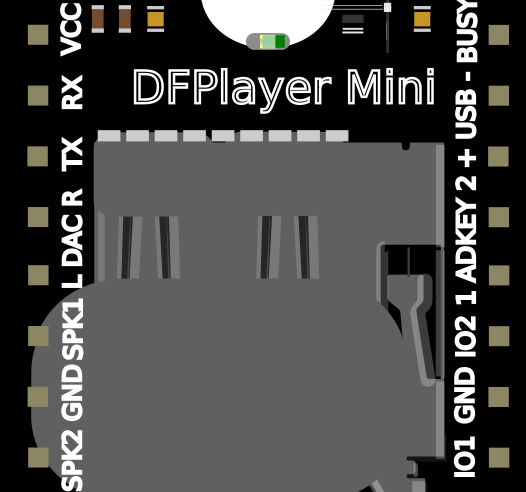
 Design with DFPlayer Mini in Cirkit Designer
Design with DFPlayer Mini in Cirkit DesignerIntroduction
The DFPlayer Mini is a compact and cost-effective MP3 player module designed for embedded audio applications. It can play audio files directly from a micro SD card and features a built-in amplifier, making it ideal for standalone or microcontroller-based projects. The module supports various audio formats, including MP3, WAV, and WMA, and offers multiple control modes such as serial communication, AD key control, and standalone operation.
Explore Projects Built with DFPlayer Mini
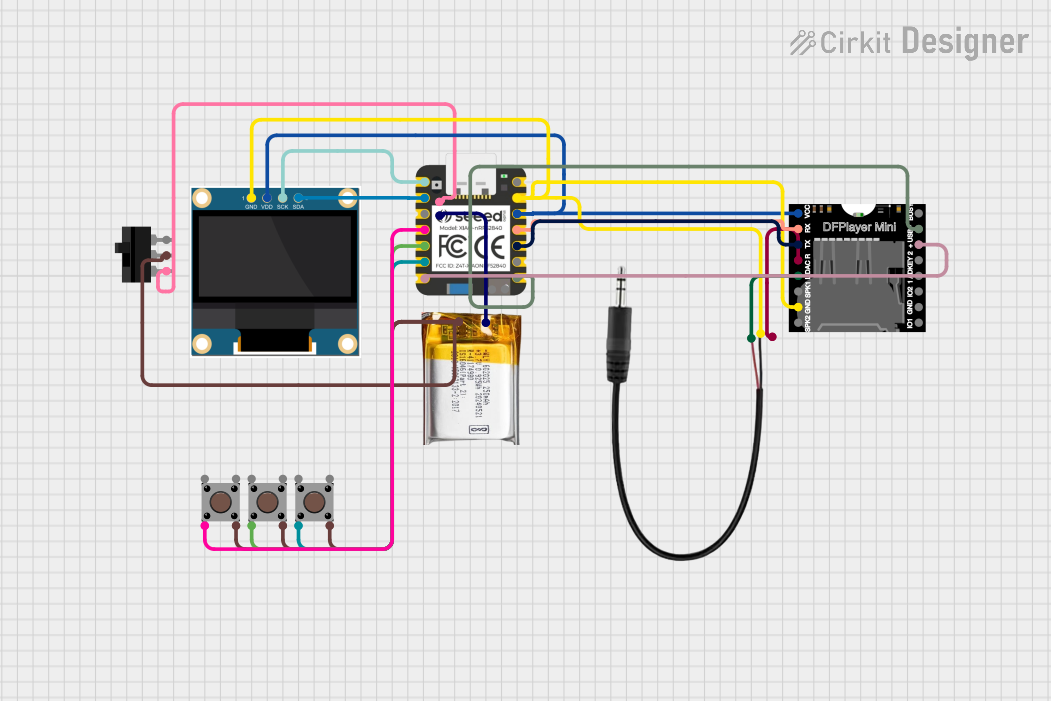
 Open Project in Cirkit Designer
Open Project in Cirkit Designer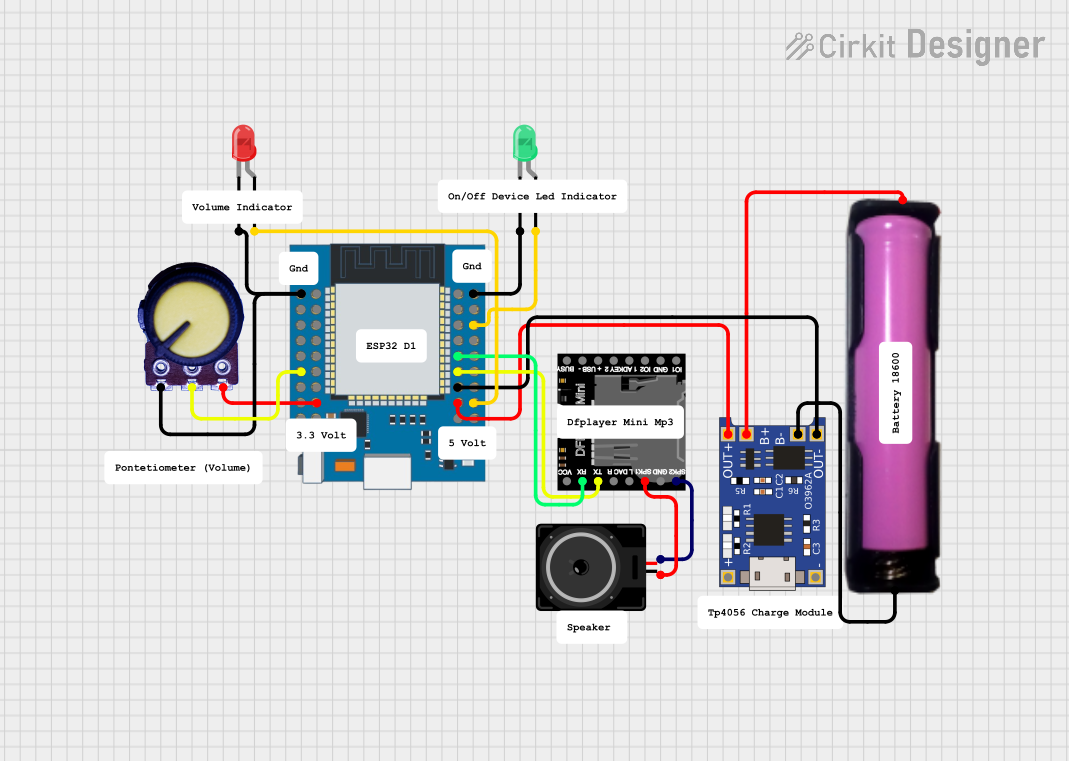
 Open Project in Cirkit Designer
Open Project in Cirkit Designer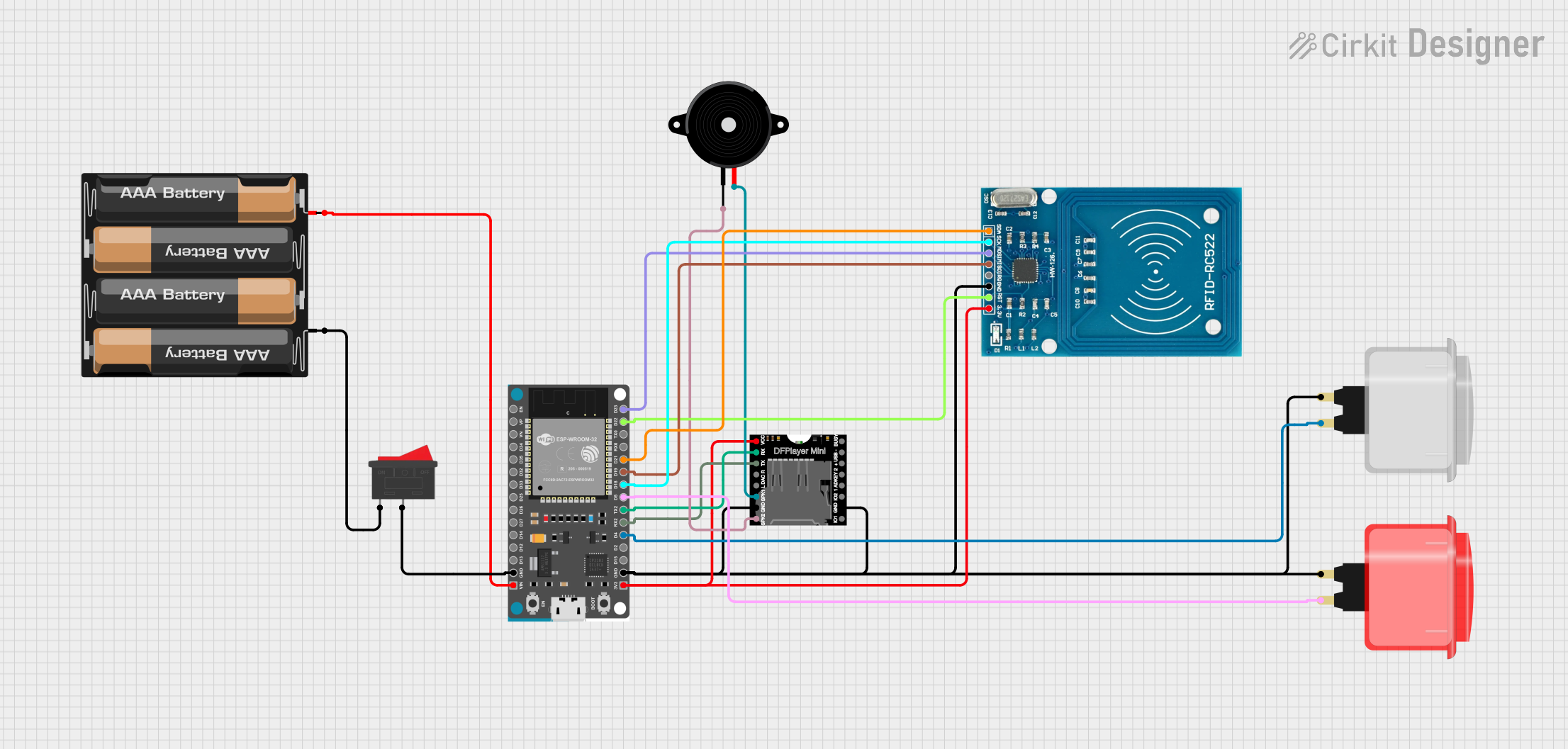
 Open Project in Cirkit Designer
Open Project in Cirkit Designer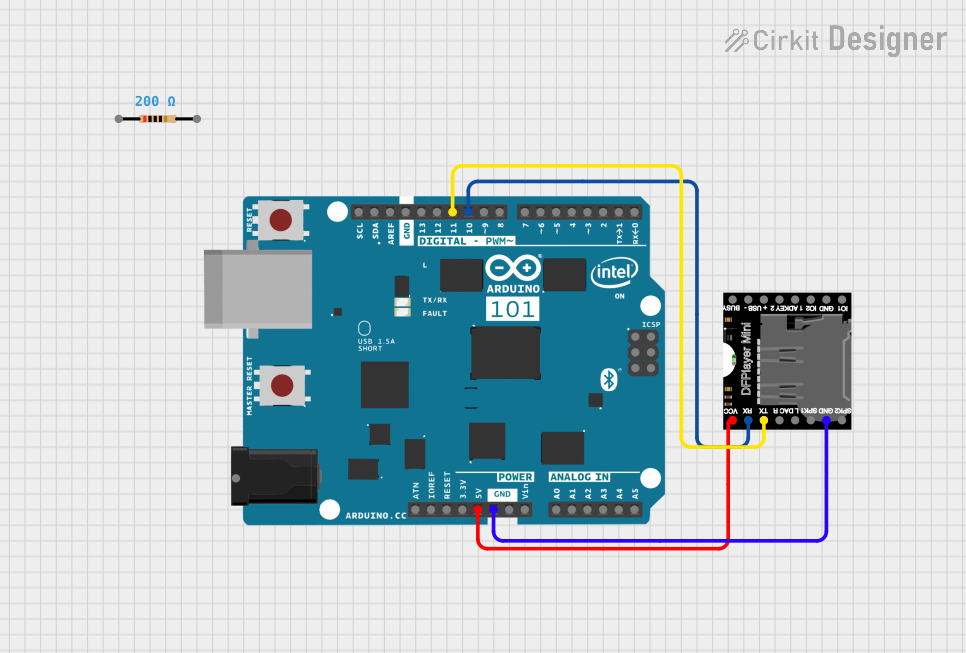
 Open Project in Cirkit Designer
Open Project in Cirkit DesignerExplore Projects Built with DFPlayer Mini

 Open Project in Cirkit Designer
Open Project in Cirkit Designer
 Open Project in Cirkit Designer
Open Project in Cirkit Designer
 Open Project in Cirkit Designer
Open Project in Cirkit Designer
 Open Project in Cirkit Designer
Open Project in Cirkit DesignerCommon Applications and Use Cases
- Voice prompts and audio feedback in embedded systems
- DIY audio players and jukeboxes
- Talking toys and interactive devices
- Alarm systems with custom audio alerts
- Educational projects and prototypes
Technical Specifications
Key Technical Details
- Operating Voltage: 3.2V to 5.0V DC
- Operating Current: 20mA (idle), up to 100mA (playback)
- Audio Formats Supported: MP3, WAV, WMA
- Storage Support: Micro SD card (up to 32GB, FAT16/FAT32 file system)
- Output Options:
- Built-in 3W mono amplifier for direct speaker connection
- Stereo audio output via DAC pins
- Control Modes:
- Serial communication (UART)
- AD key control (resistor-based buttons)
- Standalone mode (predefined playback sequences)
- Baud Rate (Default): 9600 bps
- Dimensions: 22mm x 30mm x 11mm
Pin Configuration and Descriptions
The DFPlayer Mini has 16 pins, but not all are required for basic operation. Below is a table of the most commonly used pins:
| Pin Name | Description |
|---|---|
| VCC | Power supply input (3.2V to 5.0V DC). |
| GND | Ground connection. |
| RX | UART receive pin for serial communication. Connect to the TX pin of a microcontroller. |
| TX | UART transmit pin for serial communication. Connect to the RX pin of a microcontroller. |
| SPK_1 | Positive terminal for speaker output (built-in amplifier). |
| SPK_2 | Negative terminal for speaker output (built-in amplifier). |
| DAC_R | Right channel audio output (for external amplifier or headphones). |
| DAC_L | Left channel audio output (for external amplifier or headphones). |
| ADKEY_1 | Input for AD key control (resistor-based button control). |
| ADKEY_2 | Additional input for AD key control. |
| BUSY | Output pin that indicates playback status (LOW = playing, HIGH = idle). |
Usage Instructions
How to Use the DFPlayer Mini in a Circuit
Power Supply:
- Connect the VCC pin to a 3.2V–5.0V DC power source and the GND pin to ground.
- Ensure a stable power supply to avoid noise or playback issues.
Speaker Connection:
- For direct speaker output, connect a small 3W speaker to the SPK_1 and SPK_2 pins.
- For higher-quality audio, use the DAC_L and DAC_R pins with an external amplifier.
Microcontroller Interface:
- Connect the RX pin of the DFPlayer Mini to the TX pin of the microcontroller (e.g., Arduino).
- Connect the TX pin of the DFPlayer Mini to the RX pin of the microcontroller.
- Use a common ground between the DFPlayer Mini and the microcontroller.
Micro SD Card Preparation:
- Format the micro SD card to FAT16 or FAT32.
- Store audio files in the root directory or folders named "01", "02", etc.
- File names should follow the format "0001.mp3", "0002.mp3", etc., for proper indexing.
Serial Communication:
- Use UART commands to control playback, volume, and other functions.
- Libraries like the DFPlayer Mini library for Arduino simplify communication.
Important Considerations and Best Practices
- Use a decoupling capacitor (e.g., 100µF) across the VCC and GND pins to reduce noise.
- Avoid using high-power speakers directly with the built-in amplifier to prevent damage.
- Ensure proper grounding to avoid audio distortion or communication errors.
- Use a level shifter if interfacing with a 5V microcontroller to protect the RX pin.
Example Code for Arduino UNO
Below is an example of how to use the DFPlayer Mini with an Arduino UNO to play an audio file:
#include "SoftwareSerial.h"
// Define RX and TX pins for SoftwareSerial
SoftwareSerial mySerial(10, 11); // RX = Pin 10, TX = Pin 11
void setup() {
mySerial.begin(9600); // Initialize SoftwareSerial at 9600 baud
Serial.begin(9600); // Initialize hardware serial for debugging
Serial.println("Initializing DFPlayer Mini...");
// Send initialization command to DFPlayer Mini
mySerial.write(0x7E); // Start byte
mySerial.write(0xFF); // Version
mySerial.write(0x06); // Length
mySerial.write(0x09); // Command: Select device
mySerial.write(0x00); // Feedback
mySerial.write(0x02); // Parameter 1: SD card
mySerial.write(0x00); // Parameter 2
mySerial.write(0xFE); // Checksum (high byte)
mySerial.write(0xED); // Checksum (low byte)
mySerial.write(0xEF); // End byte
delay(1000); // Wait for initialization
Serial.println("DFPlayer Mini ready.");
// Play the first audio file (0001.mp3)
playTrack(1);
}
void loop() {
// Add your code here to control playback
}
// Function to play a specific track
void playTrack(int trackNumber) {
mySerial.write(0x7E); // Start byte
mySerial.write(0xFF); // Version
mySerial.write(0x06); // Length
mySerial.write(0x03); // Command: Play track
mySerial.write(0x00); // Feedback
mySerial.write((trackNumber >> 8) & 0xFF); // High byte of track number
mySerial.write(trackNumber & 0xFF); // Low byte of track number
mySerial.write(0xFE - ((0x03 + ((trackNumber >> 8) & 0xFF) +
(trackNumber & 0xFF)) & 0xFF)); // Checksum (high byte)
mySerial.write(0xEF); // End byte
}
Troubleshooting and FAQs
Common Issues and Solutions
No Sound Output:
- Ensure the speaker is properly connected to SPK_1 and SPK_2.
- Verify that the audio file format is supported (e.g., MP3, WAV).
- Check the micro SD card for proper formatting (FAT16/FAT32) and file naming.
Playback Stutters or Noise:
- Use a high-quality micro SD card with a fast read speed.
- Add a decoupling capacitor across the VCC and GND pins to reduce noise.
Module Not Responding to Commands:
- Verify the RX and TX connections between the DFPlayer Mini and the microcontroller.
- Ensure the baud rate is set to 9600 in the code.
- Check for a common ground between the module and the microcontroller.
Files Not Playing in Order:
- Ensure file names follow the "0001.mp3", "0002.mp3" format.
- Store files in the root directory or properly named folders.
FAQs
Can I use the DFPlayer Mini without a microcontroller? Yes, the module supports standalone mode using AD key control or predefined playback sequences.
What is the maximum speaker power supported? The built-in amplifier supports up to 3W speakers. For higher power, use an external amplifier.
Can I adjust the volume programmatically? Yes, volume can be adjusted using UART commands or the DFPlayer Mini library for Arduino.